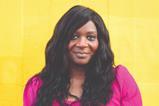It’s too easy to stereotype people and put them in boxes, observes Chine McDonald. But Jesus treated everyone as an individual, and we should too, she says

I am one of those people who – controversially – colour codes their bookshelf. I literally judge (and remember) a book by its cover. My books are filed not by content or topic, but by what they look like: a red-spined Kierkegaard book might be next to something by Marie Kondo.
Herein lies a lesson for me, and perhaps all of us. Too often we group people together in our minds – judging them by their colour, yes, but also their gender, religion or political affiliation.
I’ve been learning this lesson during this bumper year of elections around the world. Increased polarisation, exacerbated by a digital age, means we are less likely to come into contact with people who are unlike us – who do not think or vote the same way we do. Lack of contact means it is easier to make assumptions about those people, filing them away in boxes assigned to ‘people like them’ in our minds. I’m increasingly hearing of churches in the US that are now much more defined by how they vote than their theology. This cannot be good for the future of the Church.
The heated election campaign in the UK seems to have drawn us further away from each other too, as political leaders shout over each other in TV debates, call each other liars, or poke fun at others’ gaffes.
Individual stories can bring us together
But I’ve recently been reminded to receive people as individuals rather than as poster-men and women for political viewpoints. When I imagine a Trump supporter, for example, I have a certain picture in my mind of who that person might be. My assumption was challenged when I saw social media footage of elderly Chinese women wearing hats with MAGA (Make America Great Again) on them. Similarly, in a recent episode of the podcast ‘Reading Our Times’, New York Times bestselling author, David Brooks, described hearing about a Trump supporter who is “a lesbian biker who converted to Sufi Islam after surviving a plane crash”. People are, in his words, “wildly unpredictable”.
We all have a tendency to put others into boxes, but we shouldn’t. As Brooks notes: “The generalisations we make about people rarely [apply] to the individuals right in front of us.”
What we see in Jesus’ encounters in the Gospels is his engagement with the individual person and their circumstances. He sees people, even when society ignores them, casts them aside or puts them in a category and leaves them there.
So instead, this election season, I am committing to hearing people’s stories; to empathy rather than judgement. I have found that when I engage with the people in front of me – taxi drivers, childminders, hairdressers, atheists, politicians from the ‘wrong’ party – I get a glimpse, even if just for a moment, of their point of view. I may disagree with it, but there is something humanising in seeing the world as they see it. Individual stories can bring us together. Hearing about each other’s fears, losses, hopes and dreams is just one way to break down the barriers we so easily erect.





































No comments yet